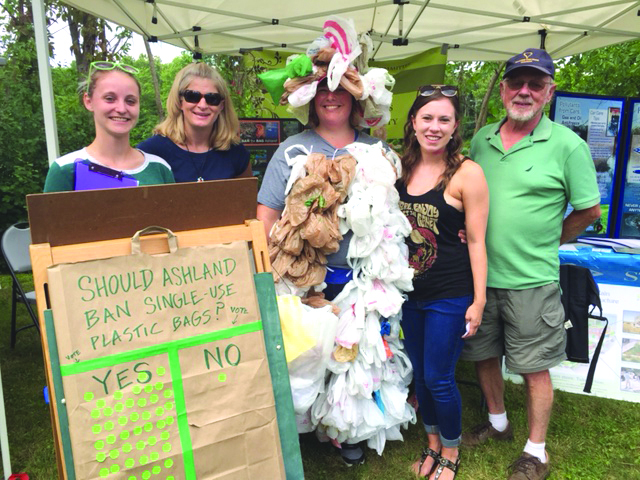Ashland is hoping to join 55 other communities in Massachusetts, such as Framingham, Natick and Wellesley that have banned plastic bags. The Ashland Sustainability Committee, the group proposing the ban, is now researching and working out details—who will enforce it and what the fines will be, for example—to bring a bylaw to town meeting on Nov. 14.
The next phase of the project will involve gathering feedback from residents, businesses and organizations, such as the Ashland Business Association, the Open Space and Recreation Committee and GreenUp Ashland, and from other communities.
“The committee plans to hold a public forum in mid September or early October to finalize the bylaw [before it goes to town meeting],” Matt Marshquist, the sustainability committee chair, said.
“We’re not leading here; we’re going with the trend across the state. In fact, it’s possible that the state may ban plastic bags in the future,” Marshquist said. (See Bill S.424, malegislature.gov/Bills/190/S424)
Reducing Waste Saves Residents Money
“The initiative fits into our overall plans to reduce waste townwide. Reducing waste of resources, such as water or energy, also saves residents money,” Marshquist explained.
“If our town were perfectly efficient, there would be zero waste. That is a lofty goal, but if we strive to achieve that goal, we can make amazing things happen. We begin to think of new solutions to save energy, perhaps creating incentives for green businesses to join our community, or establishing assistance programs to help residents upgrade their insulation. If we had a goal to reduce the tonnage of trash we create by 50 percent, it might lead us to start a municipal composting program—most trash is generally 24 percent compostable. If we could reduce the trash we send to the landfill by that volume that would impact the fees residents pay.”
Plastics Have Big Impact on the Environment
In addition to saving residents money, reducing waste and recycling have a major impact on the environment and health.
The journal Science Advances recently reported that researchers from UC Santa Barbara, Woods Hole Oceanographic Institution in Massachusetts and the University of Georgia released a landmark study of plastics in the environment. More than 9 billion tons of plastic have been produced since the 1940s, and most of that is sitting in landfills and the environment
According to the study, as of 2015, only 9 percent of the plastic ever produced had been recycled, 12 percent was incinerated, and 79 percent accumulated in landfills or the natural environment. If that trend continues, researchers project that more than 13 billion tons of plastic will be dumped in the ground or ocean by 2050.
Plastic debris ends up being ingested by sea animals. A UC Davis study found that 25 percent of fish sold in markets in California and Indonesia contained human made fibers or plastics in their guts.
“I think many people picture sea creatures eating large pieces of plastic or plastics bags, which does happen. Plastic bags in particular are often mistaken for jellyfish by marine animals,” Marshquist said. “However, there is another equally concerning threat, the toxicity of micro plastics, which is the breakdown of these plastics in the ocean. Many plastics are made from chemicals, which are toxic when ingested.”

Issue Date:
September, 2017
Article Body:
